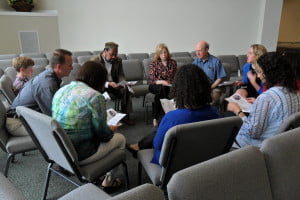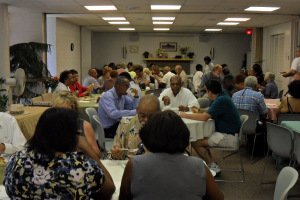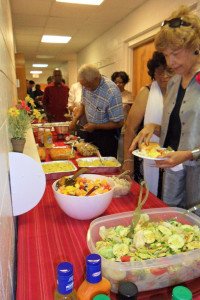The longer I am the pastor of my congregation, the more I am convinced that one of our growing edges comes in the category of diversity.
 Diversity, a cultural buzz word these days often is what someone talks about when they find themselves in a homogenous group and know it needs some spicing up. It's a word we often use to describe our intentions, but rarely the reality. It's something that makes us feel good to talk about but scares us to death to live out.
Diversity, a cultural buzz word these days often is what someone talks about when they find themselves in a homogenous group and know it needs some spicing up. It's a word we often use to describe our intentions, but rarely the reality. It's something that makes us feel good to talk about but scares us to death to live out.
Yet, without mandate from an overseeing bishop (since Baptists don't have them), it's something that Washington Plaza has sought to be for over the years. We've regularly welcomed with ease members from other denominational backgrounds without asking for re-baptism. Many nationalities are represented in the membership rolls at all times. We have gay and straight members alike, no big deal. We have folks who are all sides of the theological spectrum on a number of given issues. And, we love the republican delegation of members as much as we do the democratic leaning folks.
 All of this is great and should be celebrated and is one of the reasons why I am proud to be Washington Plaza's pastor, but I wonder if diversity is something that we find merely in our community and our individual lives as a noun or has it transformed our lives as a verb?
All of this is great and should be celebrated and is one of the reasons why I am proud to be Washington Plaza's pastor, but I wonder if diversity is something that we find merely in our community and our individual lives as a noun or has it transformed our lives as a verb?
When I came back from my Interfaith trip to Israel in January, I became more convinced that if I said I was a pastor who cultivated diversity in my congregation and in my life, then there was going to have changes all around in my priorities. (I even wrote an article in Baptist Today about just this exhortation).
 And, as I have begun to make changes, I've seen that diversity practice exists as an intentional lifestyle choice. And, it is a choice, I am challenging Washington Plaza folks to continue to make too.
And, as I have begun to make changes, I've seen that diversity practice exists as an intentional lifestyle choice. And, it is a choice, I am challenging Washington Plaza folks to continue to make too.
I've found that it's a choice that shows up in who I go to lunch with. It's a choice that has everything to do with who comes to dinner at my home and to whose homes I go. It's a choice that says everything about what books I read, how I prepare for sermons and most importantly how I lead.
In light of all of this, as a congregation, we've been busy building relationships that are more than token partnerships right in our own neighborhood. It's good to start where you are, right? We're seeking to make real friends with other congregations which are like us theologically but different from us racially. We're seeking to make friends with those who look like us but theologically see the world going in different directions than us. We are seeking to make friends with people that we have never interacted with before such our Muslim brothers and sisters.
In the past six months, we've hosted Martin Luther King Jr. Christian Church for a celebration of diversity special afternoon service and reception, we've shared in a community forum at Oakbrook Church about Israel and Palestine, we've hosted our friends again from MLK for a shared meal, we've served as the hosting congregation for the Reston Interfaith Ministrium bi-monthly gatherings and we've welcomed friends in our facility from Northern VA Hebrew Congregation and other faith communities for an Interfaith book club discussion. Most of these congregations are in a less than five-mile radius of where we are located-- proving you don't have to go far to find ways to live into your growth of diversity.
And, this is just the beginning as I see it. Why? Because diversity is a verb. To be diverse, it's an action that one must make their own, over and over again until it becomes so normal that it doesn't feel like an imposed concept but simply who we are as people.
I'm glad to be on this journey of neighborhood partnerships, seeing to be a witness of Christ's love in the Reston area. It's a work that has changed my life and I know will continue to do so for our church as the testimony of diversity as a verb lives on.